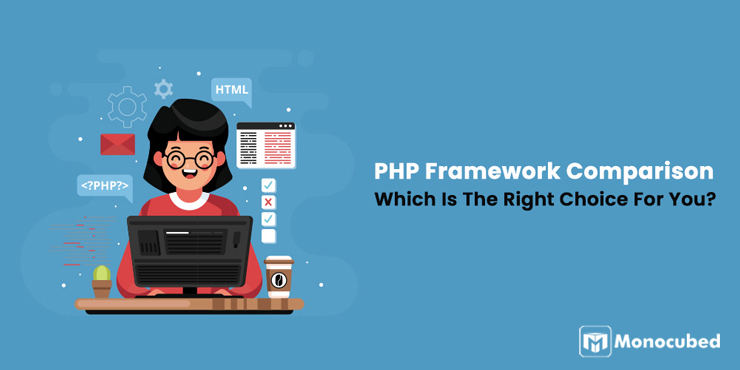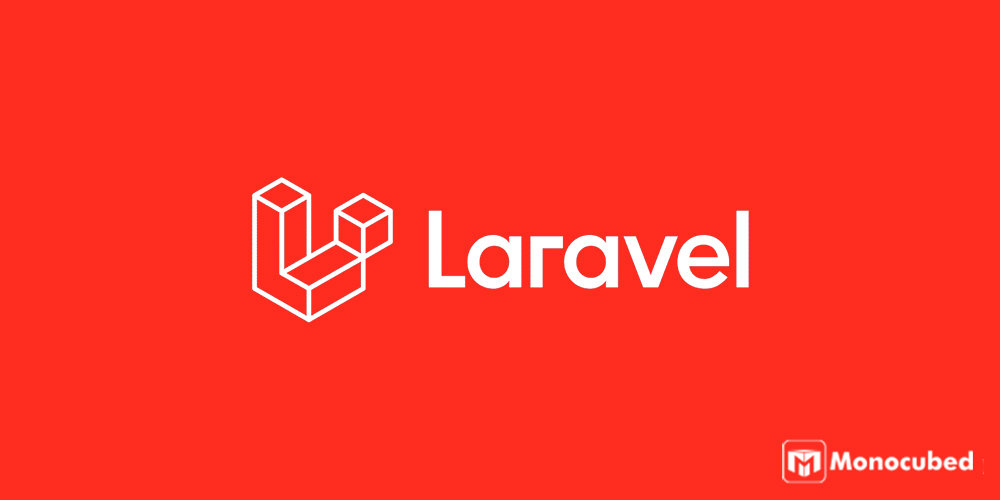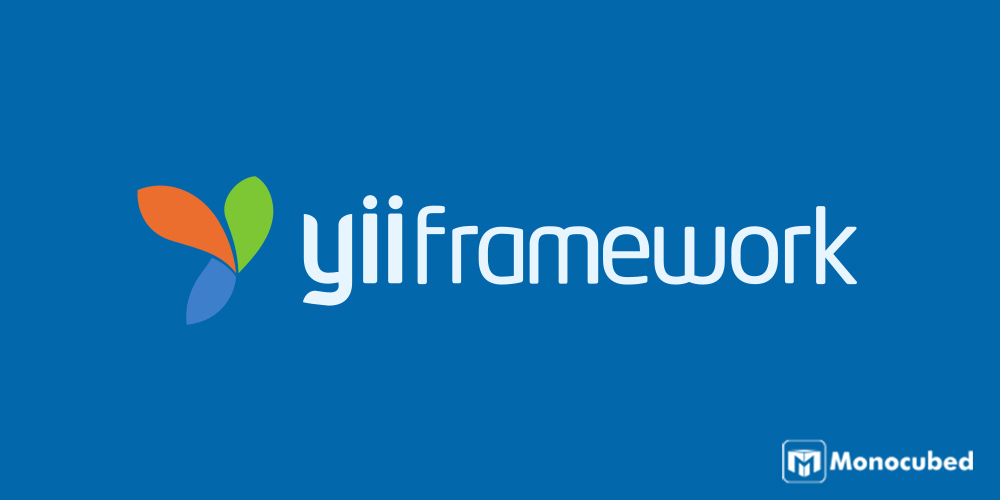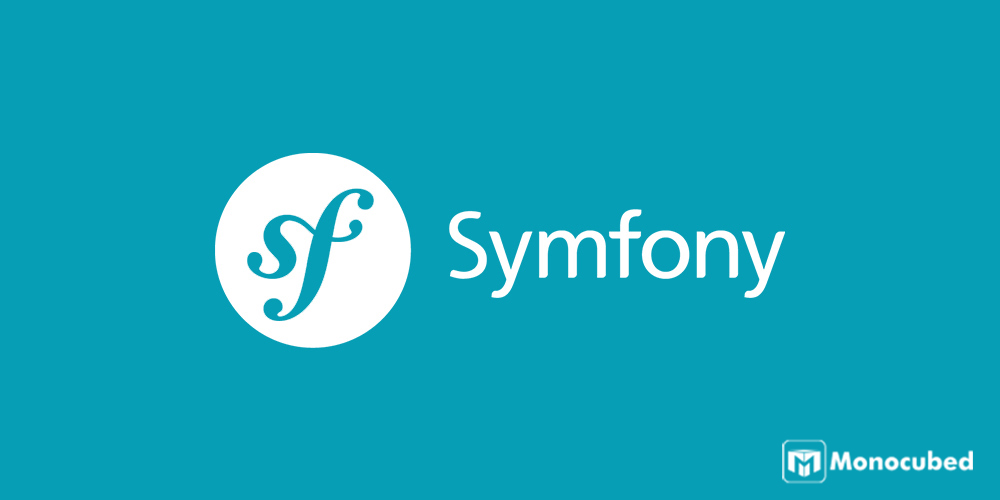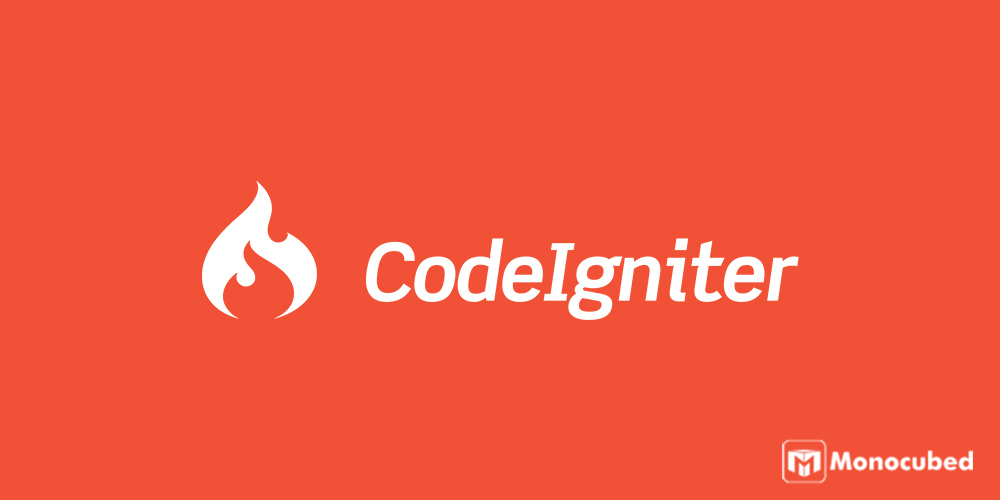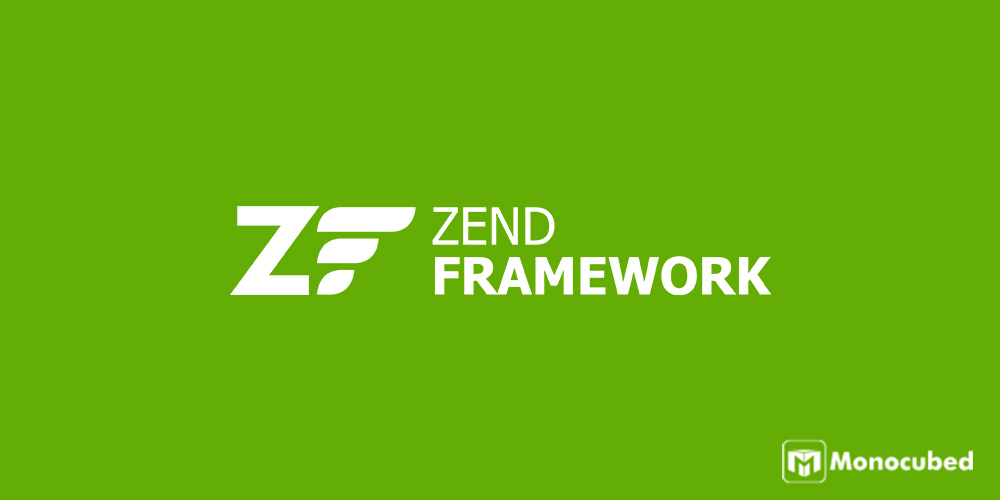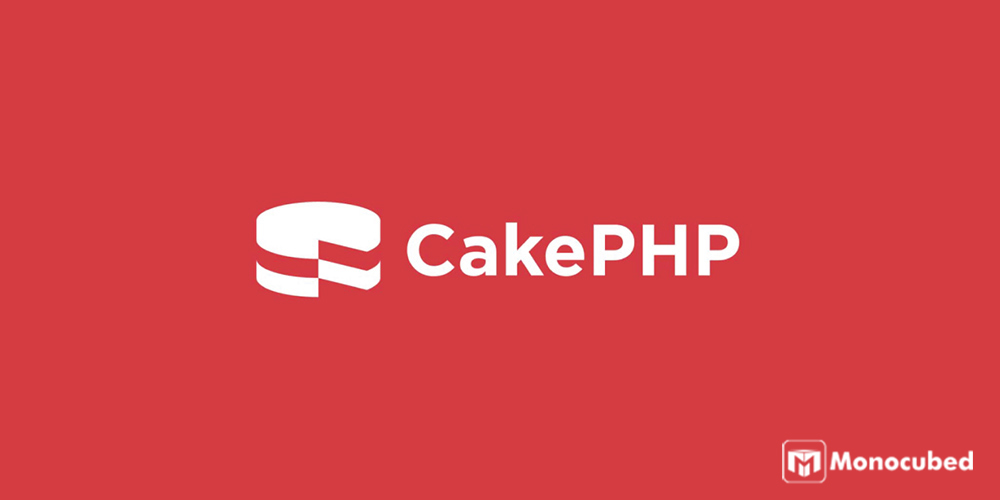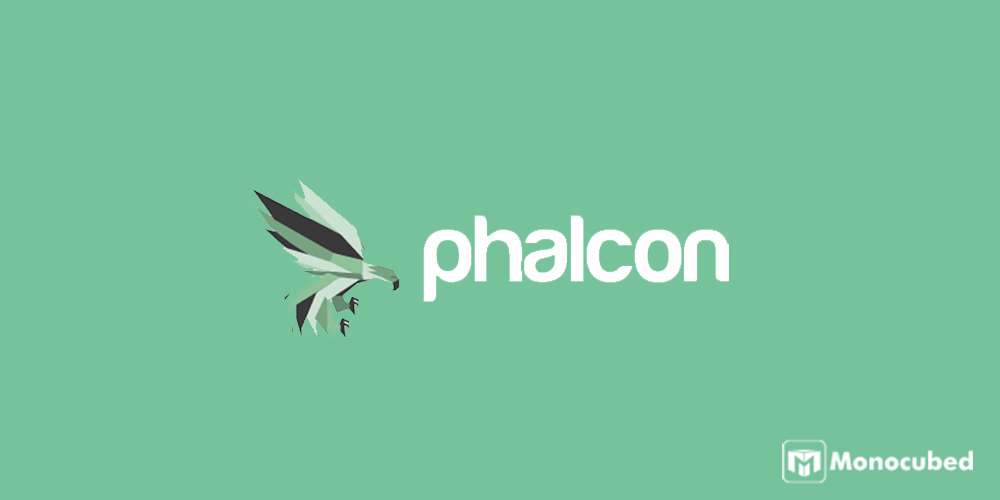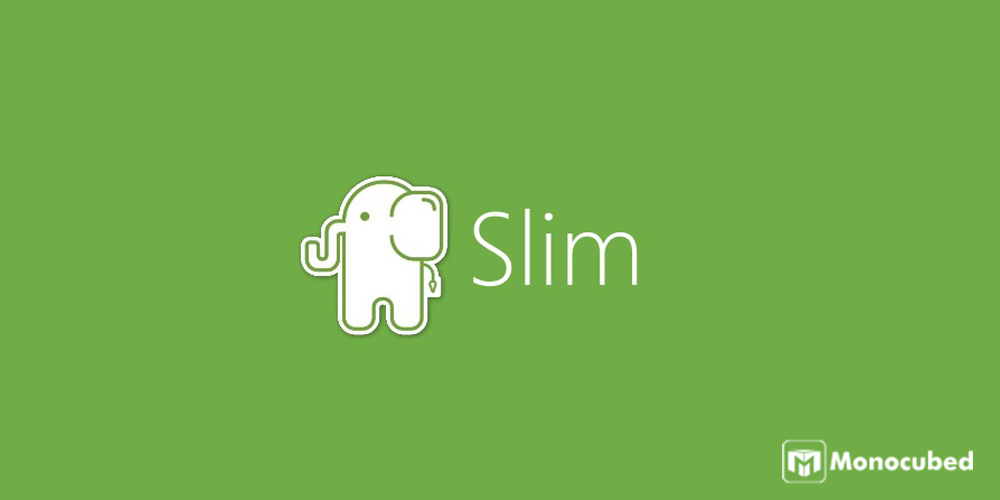Web frameworks form one of the most important pillars of web development. Finding the ideal framework is just as important as choosing the right programming languages. PHP is one such popular scripting language that is beloved by web application developers.
According to this W3Techs PHP survey, PHP is used by 79.2 percent of the websites on the internet for server-side programming. Therefore it is no surprise that there are many frameworks available for working with PHP.
We use a lot of PHP frameworks and tools in our own projects. We have curated a list of top PHP framework comparisons, from our own experience, to help you find the right framework for developing web apps.
But first, let’s understand what PHP web frameworks are and why they are so widely used.
Table of Content
What are PHP Frameworks?
A PHP framework is a full-featured platform, incorporated with core libraries, modules, configuration routines, source code editors, and design architecture.
PHP web application framework simplifies the web development lifecycle by deploying the best design practices, automating repetitive tasks, and packaging pre-coded functions.
They also provide database manipulation operations for executing complicated queries, different software design patterns for rapid development along with testing and deployment features.
But there are so many good frameworks available for web developers today. To solve your confusion, we have compiled our years of experience as a PHP application development company into this comparative list of the 8 most popular PHP frameworks in the next section.
Some of The Best PHP Web Frameworks To Use
According to research by JetBrains, there are many PHP frameworks and platforms that are used regularly by web developers for backend development. The most used framework is Laravel, while WordPress is the most used website building platform for PHP developers.
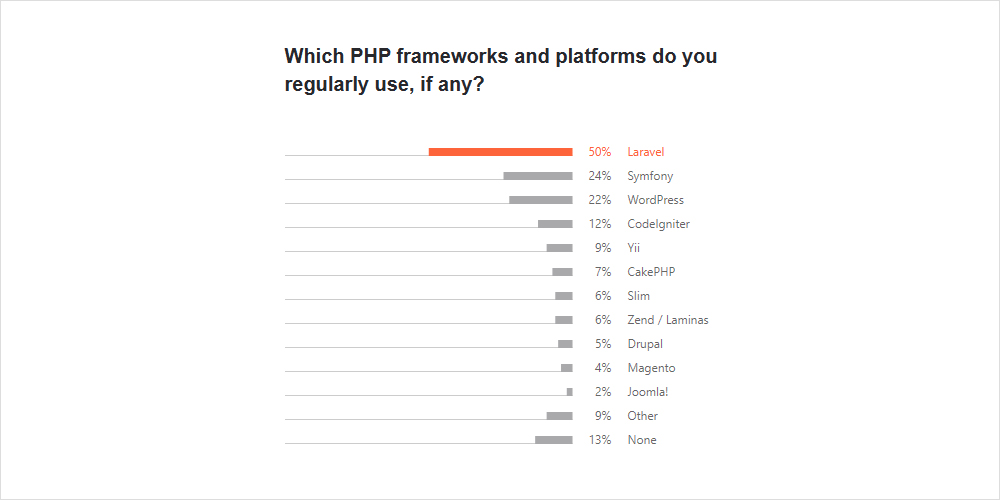
Over the years, many new PHP development tools and frameworks such as Yii, Slim, and Laravel have been developed that overcame the shortcomings of CodeIgniter and Symfony. Let’s look at the comparison of top PHP frameworks of 2022 –
Laravel
“Roughly half of the developers we surveyed use Laravel, which makes it one of the 3 most popular platforms, along with Symfony and WordPress.” – JetBrains Survey 2022.
Laravel is a PHP framework used for building full-stack apps. It is purely meant for developing MVC-based applications. It is open-source with a huge community backing.
With an aim to provide a more advanced alternative to the CodeIgniter framework, it shares a lot of features, along with architectural patterns, with Symfony. It has a state-of-the-art powerful templating engine.
Laravel also provides configurations for the Authentication and Authorization system. This means in just a few artisans commands your website will be equipped with secure user authentication and authorization features.
It supports unit testing and can automate the debugging process. With features like lazy loading and an adhesive ORM, this framework is apt for the development of prototypes quickly. As a Laravel web development company, we use the framework for cloud development, scalable web apps and cost-effective prototypes.
Want to know why Laravel is the most popular PHP frameworks? Check out the various reasons mentioned in our blog – Why Laravel PHP Framework is Best?
Yii
Created by Qiang Xue in 2008, Yii is a secure, fast, high-performing web framework based on PHP language. Yii stands for “Yes It Is” and is a minimalistic solution for developing specific websites that are for a niche of users.
Like most PHP frameworks, it also implements the MVC software design paradigm and executes the DRY (Don’t Repeat Yourself) concept everywhere. Yii is easily integrated with jQuery and AJAX.
With a Model–view–controller design pattern, the code generated by Yii components and command line tools complies with the XHTML standard. It is suitable for all types of projects and has many optimizing tools in its API for designing a well-functioning, performative website.
Symfony
Symfony is a set of PHP components and methodology for developing scalable, high-performance applications. One of the oldest PHP frameworks, Symfony incorporates the advantage of pre-configured components for templating, translation, dependency injection, form configurations, event dispatcher, and more.
The official site defines its philosophy as – “Embracing and promoting professionalism, best practices, standardization and interoperability of applications.” It is increasingly gaining popularity and is preferred over other frameworks due to its versatility, flexibility, and scalability.
Another added advantage of Symphony is that it makes use of open source projects of PHP such as PHPUnit, a PHP-based unit testing framework, Twig as a templating engine, Doctrine as object-relational mapping layer, and PHP Data Objects is a database abstraction layer.
CodeIgniter
CodeIgniter is one of the oldest open-source PHP frameworks. Mainly used for custom building eCommerce web applications, it is best for developing secured websites. It is a popular PHP framework for high performance despite its extremely small footprint.
It is mainly used for the quick development of payment gateways and eCommerce sites.
CodeIgniter is extremely user-friendly and can be easily adapted for web app development usage. It is a top choice for a start-up business as it provides scalability along with the many inbuilt features for protection against vulnerabilities.
In addition, it does not force any restrictive coding rules and provides flexibility to be creative, which is an important aspect for startups.
Want to Develop an eCommerce Website?
Talk to us and start developing a secure eCommerce web solution with a high ROI.
Zend
Zend is an object-oriented framework that is highly customizable and helps web developers to easily control its every feature. It enables the creation of attractive, user-driven websites.
The Zend framework is now evolved into the open-source ‘The Laminas Project’, an enterprise-ready PHP framework and components. The new Zend is a Composer meta-package holding a collection of professional independent PHP-based packages and modules.
You also have debugging tools available on the Zend Server, which is a web server compatible with Zend web apps.
CakePHP
CakePHP is a robust open-source web framework written in PHP scripting language. It follows the MVC design pattern and is closely modeled against the concepts used in Ruby on Rails.
It is a ‘Batteries Included’ framework, deploying ‘ready-to-use’ philosophy, that includes functions such as –
- Database access
- Data caching
- Validation
- Authentication
- Built-in translations
Recently, a commercial project was developed by Larry Masters called CakeDC. It offers development, consultancy, training, and code review services.
Phalcon
Phalcon is a full-stack PHP framework that functions on the MVC web architecture pattern. Released in 2012, it is written in C and C++ and is perfect for creating highly configurable web applications.
One prominent feature of Phalcon is its commitment to follow enterprise development guidelines. A PHP web developer has access to a lot of functionalities such as speed and efficiency, an asset management tool, a universal autoloader, measures for protecting the website against security attacks and caching.
Slim
Slim is an agile microframework for developing powerful web apps and APIs. Slim has a lean and fast codebase as it has no third-party dependencies and is very easy to learn and use.
It focuses on receiving an HTTP request from a web browser, invoking a callback, and returning an HTTP code as a response to display the web page contents.
Along with these, there are some additional utilities offered by Slim such as –
- A dependency injection container
- A powerful Atlas ORM
- URL map routing
- interoperability
It is particularly suited to building small and simple PHP applications and APIs. If you need to implement over-the-top features, Slim is also integrable with third-party solutions.
Top 8 PHP Framework Comparison With Pros And Cons
We have curated a table to compare PHP frameworks performance that include Laravel, Yii, Phalcon, Slim, and Symfony. Looking at the benefits and demerits of using each will help you find the best framework for your next web application development.
| Framework | Pros | Cons |
|---|---|---|
| Laravel |
|
|
| Yii |
|
|
| CodeIgniter |
|
|
| Symfony |
|
|
| Phalcon |
|
|
| Slim |
|
|
| CakePHP |
|
|
| Zend Framework |
|
|
Confused Which Web Framework to Use?
Don’t worry. Talk to our expert who will analyze your project and suggest the right frameworks and tools to use. Free of cost.
Which Framework Is Right For You?
Before choosing a framework, it is important to identify your requirements and priorities. Here is a list of questions and criteria you should keep in mind while choosing a framework for your PHP project-
- What are the available resources?
- What expertise do your developers hold? How much training period will be required for each framework?
- Does it meet the technical requirements of your project?
- What database are you using for your project? Choose a framework that completely supports the database.
- Does the framework have adequate documentation?
- Does the framework have a large and vibrant community?
- What are security requirements? Which framework supports security measures such as Cross-Site Scripting (XSS), Cross-Site Request Forgery (CSRF), SQL Injection.
After you have the answers to the above questions, it will be fairly easy to find the ideal tool for your project. You can arrive at a decision after analyzing the benefits and use cases of each framework.
According to our experts, CodeIgniter and Yii are ideal choices for the development of an eCommerce website and web application as they offer state-of-the-art security measures.
When it comes to speed, it is best to choose lightweight PHP frameworks such as CodeIgniter. Unlike other popular PHP frameworks, Slim doesn’t follow the MVC architecture and thus Slim is a good option for when you require flexibility.
CakePHP and Laravel are preferable when you work on large-scale applications which require extensive database management. Use Symfony when you require customization and flexibility along with strong scalability and stability.
Zend is best for when you deal with large databases but require server-side scripting. Most PHP frameworks have external database support, so there is no conflict in the choices. Phalcon is the fastest PHP frameworks and is perfect for developing Minimum Value Products because of its rapid prototyping abilities.
Frequently Asked Questions
What is an alternative to Laravel?
There are many frameworks available for working with PHP. Some more lightweight solutions are the Phalcon and Symfony. You can also look at the micro-framework Slim for developing fast REST APIs. Many companies also prefer CodeIgniter for eCommerce websites owing to the security features it offers.
Is Codeigniter better than other frameworks?
No. CodeIgniter is a better choice for some specific tasks, but it fails in other development fields. So if you are looking for a framework that suits database-intensive, eCommerce or scalable sites, CodeIgniter is the best option out of other PHP frameworks.
Which is the best PHP framework?
There are many good PHP frameworks. Today Laravel is a good option as opposed to the older cumbersome CakePHP or CodeIgniter. It is lightweight and minimalistic which helps for speedy development without memory delays. Other best frameworks are Yii or Symfony or Slim.
Why use PHP web frameworks?
PHP is a widely used scripting language, generally preferred for web development. A PHP framework provides a platform to create PHP web applications and websites. With libraries including pre-coded components and modules, you are able to avoid repetitive coding and streamlining the development process.
Conclusion
We have conducted a PHP frameworks comparison to determine the best PHP frameworks for developers like you to use. Laravel, Symfony, Yii, and CodeIgniter are some of the most efficient frameworks for PHP web application development today.
It is most important to analyze your project requirements before choosing a suitable framework for web design. Do you still have doubts about which framework to commit to?
We, at Monocubed, can understand your requirements and provide the ideal web-based solution that will help you be competitive in the market. You can reach out to us on Facebook or Twitter if you have any queries.
 By Jeel Patel
By Jeel Patel
